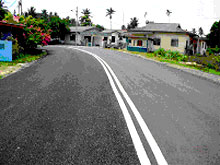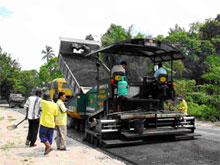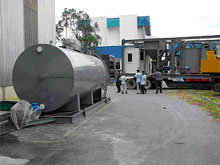Conventional road system using
bitumen and aggregates is prone to premature failures due to cracks
and rutting and subsequently require repeated expensive maintenance
during its service life. Incorporating scrap tires which has been
ground to a specified particle size into a bituminous mixture will
offer many advantages and they are:
- Durability - rubberised pavements
have excellent durability in terms of cracking and aging resistance.
- Reduction in maintenance - the Malaysian
Public Works Department spends on average RM400 million every
year on road maintenance and the rubberised bitumen could result
in cost saving to the country.
- Cost effectiveness - The life cycle
cost is lower because of long life cycle of rubberised pavements
and enhanced performance and in addition the thickness of the
pavement can be reduced and this lowers the initial construction
cost.
- Increase skid resistance - provide
added safety to road users.
- Noise reduction - rubberised pavement
provides lower tire noise and hence a quieter ride.
- Environmentally friendly - the ever
increasing number of scrap tires can be safely recycled and hence
protects the environment.
 |
|

The left lane is the Malaysian first open-graded pavement which incorporates
rubberised bitumen at Batu Hitam, Kuantan. Resurfaced in September
2002 with a total length of 200m. An open-graded system provides efficient
drainage and good skid resistance

Resurfacing work was being carried out at the Batu Hitam stretch

Since the Malaysian premix plants do not have facilities to effectively
blend the ground rubber and bitumen, the Malaysian Rubber Board has
constructed two dedicated mobile mixers together with storage tanks
that can be easily interfaced with premix plants with minimal modifications.
|




